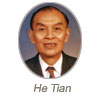AWARDEE OF TECHNOLOGICAL SCIENCES PRIZE
LIU TIANQUAN
Abstract
In 1927, Liu Tianquan was born in Pingxiang, Jiangxi Province. In 1945, he graduated from Fenyi Normal School, and took a position as a lecturer in the subordinate elementary school after the graduation. He achieved the high school diploma in 1949, and was pointed as an elementary school principal as well as a lecturer in the same year.
Before 1952, prof. Liu studied at Hunan University. He studied Russian in Beijing in 1953. After passing the examination in 1953, he went to Poland to continue his education, supported by the Chinese governmental scholarship. He graduated in 1957 from University of Mining and Metallurgy in Cracow, Poland, with a bachelor degree. In 1958, he obtained a master degree from the same university.
Upon his return to China in 1959, Prof. Liu was appointed as a research engineer and later senior research engineer in Beijing Mining Institute, Central Mining Research Institute, Beijing, China. He maintained that position until 1994, when he was promoted to head the Academic Committee, Central Mining Research Institute. In 1997, He was appointed as the Chief Engineer of the Central Mining Research Institute (currently China Coal Research Institute) and remains in this position till present. He is the standing councillor of China Coal Society and Vice-President of Chinese Society for Rock Mechanic and Engineering.
Prof. Liu participated and was in charge of numerous research projects, as itemized in the following:
· coal mining under Huai river and under quick-sand strata in Huainan and Huaibei mining districts (1959 - 1965);
· thick coal seam mining under lakes and surface water in Chaili mine (1965 - 1968);
· mining under aquifers in offshore areas in Longkou mining district (1968 - 1975);
· new concepts of mining influences (1975 - 1982);
· reducing the dimensions of water-proof coal pillars in Huainan and Huaibei districts (1982 - 1989);
· minimizing slope instability and impact of surface deformation on the structural stability of the No. 1 Petroleum Refinery Factory due to open pit mining in Fushun in order to maintain the structure integrity during mining operation (1990 - 1995).
Prof. Liu has played key roles in many important national projects. For example, since 1996, he has been in charge of a key research project funded by the National Natural Science Foundation of China to investigate strata movement and associated failure over coal mines. He actively initiates and participates collaborative research projects and academic exchanges with the scientists from many foreign countries, such as those from Poland, United States, United Kingdom, and Germany.
Due to his significant contributions to the research related to the mining engineering, in 1994, Prof. Liu was elected as the Academician in the first group of the Chinese Engineering Academy. During the past forty years, he achieved ground-breaking results in identifying and controlling mining influences and developed special mining techniques to maximize the production under difficult environments. He was the first person to initiate and develop the theory of underground mining influence and its control. Based on this theory, he promotes a multi-disciplinary approach in tackling technical problems related to resource exploitation and utilization during production using special mining methods. These methods stimulate the active participation across the disciples, which include but are not limited to mining, mine surveying, mine hydrogeology, and mine construction. Among his countless technical contributions, his theory and technology in extracting outcrop coal pillars, as well as in mining under aquifers, have been recognized as the cutting edges at the international levels.






